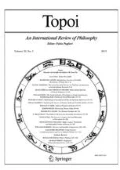Abstract
Both because of the vagueness of the word ‘give’ when speaking about giving reasons, and because we lack an adequate definition of ‘reasons’, there is a harmful ambiguity in the expression ‘giving reasons’. Particularly, straightforwardly identifying argumentation with reasons giving would make of virtually any interplay a piece of argumentation. Besides, if we adopt the mainstream definition of reasons as “considerations that count in favour of doing or believing something”, then only good argumentation would count as argumentation. In this paper, I defend a qualified characterization of argumentation as reasons giving that is shown to be fruitful for shedding light on the practice of giving reasons, and an inferentialist conception of reasons that makes room for speaking of “bad reasons” and, consequently, makes it possible to talk of argumentation as reasons giving even if we are talking about bad argumentation.
Similar content being viewed by others
Notes
Actually, this is the standard definition for normative reasons—as opposed to motivating reasons. In discussing how to understand argumentation as a practice of giving reasons, I will be considering only normative reasons, that is, reasons that justify an individual in believing or acting as she does. Motivating reasons—that is, reasons that explain why an individual believes, or acts, as she does—will be kept out of our discussion. For, not in vain, argumentation is not an explanatory but a justificatory device: the reasons that we give in arguing are meant to justify that for which we offer such reasons. They are not meant to explain it because, in the linguistic-pragmatic context of arguing, that for which we offer reasons is not taken for granted—which is a linguistic-pragmatic condition for explaining it—but quite the opposite: it is precisely taken to be in need of justification (see McKeon 2013, p. 300, for a defence of this view).
In Bermejo-Luque (2011, chap. 2), I explain that one of the main problems of this type of instrumentalism is that it is unable to provide a rationale for normative models of argumentation.
Actually, Pinto says that it is arguments, not argumentation, what constitutes an invitation to inference. Yet, because he says that an argument is “a set of statements or propositions that one person offers to another in the attempt to induce that other person to accept some conclusion” (Pinto 1995, p. 271), whereas argumentation is “an interactive social process involving two or more people, in which the principal goal is to induce belief or agreement through the presentation of arguments” (1995, p. 271), I would rather say that it is argumentation (as an activity), not arguments (as abstract entities), what amounts to an invitation to inference.
In literature, this kind of judgment is usually called “non-inferential.” However I would rather call it “direct” because I would like to leave aside the question of whether, in the end, a judgment must be inferentially articulated for it to have any content at all. In fact, I am willing to say that direct judgments depend upon previous inferences. For example, I usually directly judge that it’s time for a coffee when I hear a familiar sound from a bell in a nearby church. Such a judgment is caused by this sound having that impact on me: when I hear it in normal circumstances, I come to believe that it’s time for a coffee. Yet, the fact that the sound has this impact on me depends on my having associated it, one way or another, with being time for a coffee when it sounded in normal circumstances. This association is something that certainly depends on many inferences that I have made over time. Yet, despite its inferential articulation, my judgment counts as a direct judgment because I didn’t make these inferences in order to judge in this particular case that it’s time for a coffee. Rather, I merely heard a sound that triggered the judgment “now it’s time for a coffee”.
I leave aside the question of whether or not a judgment caused by an event that could not justify it at all (like a drug, a mental disorder or a blow to the head) is a real judgment after all. If we think that it is, then judging that there is a pink elephant in front of you because of a drug would also be a case of directly judging.
Consequently, the distinction between direct and indirect judgments is not meant to be exhaustive regarding the possible ways of coming to believe new things. For there may be judgments prompted by other judgments in a non-inferential way. This would be the case, for example, of associations of ideas and processes like remembering something by noticing something else, etc.
I think this distinction corresponds, in the realm of reasonings, to the Toulmian distinction between warrant-using and warrant-establishing arguments.
Simard Smith and Moldovan (2011, p. 256) also understand that the illative relation between propositions that structures sets of propositions as arguments “is created by an agent when the agent intends that a conclusion follows from a set of premises in a certain way.”
On this account, it is one thing to determine argumentation goodness—that is, to determine whether or not a given speech-act of arguing succeeds in showing its target claim to be correct—and another thing to determine whether or not the addressee of that act of arguing will take it to be a good one. In Bermejo-Luque (2011, pp. 159–162), I contend that something like Grice’s Cooperative Principle is a good starting point to settle the pragmatic conditions that determine whether a speech-act is a good act of showing.
Or, rather, the goal that we pursue in arguing: as I have explained in Bermejo-Luque (2011, pp. 23–40), our normative models for argumentation must focus on the constitutive goal of arguing, which is justifying, if their normative status is to be justified in turn.
For Toulmin, argument goodness is a matter of the warrant that sanctions the inference, not of accordance with formal rules of inference. See Bermejo-Luque (2011, pp. 88–101) for a defence of this conception of logical normativity.
Because Toulmin does not deal with argumentation from a linguistic-pragmatic perspective, his account of qualifiers is quite different from the one presented here. Particularly, Toulmin does not distinguish between epistemic and ontological qualifiers, because he is not concerned with the differences between the pragmatic force of ordinary constatives and the characteristic pragmatic force of the speech-act of concluding.
In my view, this is the sense in which motivating reasons, as opposed to merely explanatory ones, do also have normative force (see Álvarez 2010 for a defence of the view that normative reasons are different from explanatory ones).
References
Álvarez M (2010) Kinds of reasons: an essay in the philosophy of action. Oxford University Press, Oxford
Bach K, Harnish RM (1979) Linguistic communication and speech-acts. MIT Press, Cambridge
Bermejo-Luque L (2011) Giving reasons. A linguistic-pragmatic approach to argumentation theory. Springer, Dordrecht
Birdsell D, Groarke L (1996) Introduction: argumentation and advocacy. J Am Forensic Assoc 33:1–10
Black M (1964) Critical thinking. Prentice Hall, Englewood Cliffs
Campolo C (2005) Treacherous ascents: on seeking common ground for conflict resolution. Informal Logic 25:37–50
Copi IM, Cohen C (1990) Introduction to logic, 8th edn. Macmillan, New York
Gilbert M (1997) Coalescent argumentation. Lawrence Erlbaum Associates, Hillsdale
Hamblin C (1970) Fallacies. Methuen, London
Harman G (1986) Change in view. MIT Press, Cambridge
McKeon M (2013) On the rationale for distinguishing arguments from explanations. Argumentation 27:283–303
Pinto R (1995) The relation of argument to inference. In: van Eemeren FH, Grootendorst R, Blair JA, Willard CA (eds) Perspectives and approaches. Proceedings of the third ISSA conference on argumentation, vol I. SicSat, Amsterdam, pp 271–286
Simard Smith P, Moldovan A (2011) Arguments as abstract objects. Informal Logic 31(3):230–261
Turner D, Wright L (2005) Revisiting deep disagreement. Informal Logic 25:25–35
van Eemeren FH, Grootendorst R (1984) Speech-acts in argumentative discussions. A theoretical model for the analysis of discussions directed towards solving conflicts of opinion. Foris, Dordrech/Mounton de Gruyter, Berlin
van Eemeren FH, Grootendorst R (1992) Argumentation, communication and fallacies. Lawrence Erlbaum Associates, Hillsdale
Walton D (1989) Informal logic: a handbook for critical argumentation. Cambridge University Press, Cambridge
Acknowledgments
I wish to thank Javier Rodríguez Alcázar and the Topoi reviewers of this paper for their insightful comments and criticisms. The work presented in this paper has been financed by a Ramón y Cajal Research Fellowship and by the research Project FFI2014-54681-P of the Spanish Ministry of Science and Innovation.
Author information
Authors and Affiliations
Corresponding author
Rights and permissions
About this article
Cite this article
Bermejo-Luque, L. Giving Reasons Does Not Always Amount to Arguing. Topoi 38, 659–668 (2019). https://doi.org/10.1007/s11245-015-9336-1
Published:
Issue Date:
DOI: https://doi.org/10.1007/s11245-015-9336-1



